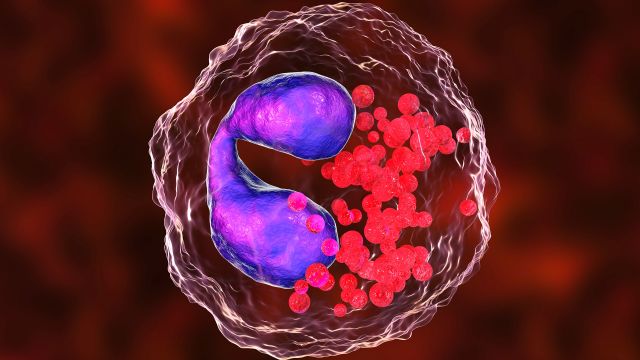Asthma is a condition that narrows a person’s airways, making it difficult to breathe. There are a few different subtypes of asthma, one of which is eosinophilic asthma, or e-asthma. To better understand asthma and e-asthma, it can help to understand the structure of the airways inside the human body.
Your airways are a series of branching tubes that air passes through on its way into and out of the lungs. The largest airway is the trachea (commonly called the windpipe). The trachea branches into two smaller pipes called bronchi, which lead into the left and right lungs. The bronchi branch off into narrower and narrower airways. This structure is sometimes called the bronchial tree—think of the windpipe as the trunk, the bronchi as large branches, and the narrowing airways as thinner branches. The smallest airways are the bronchioles, which end in small air sacs called alveoli. The walls of the alveoli are packed with blood vessels and allow oxygen to move into the blood and carbon dioxide to move out of the blood.
Asthma
When a person has asthma, their airways become narrow in response to triggers. Asthma triggers include allergens, exercise, irritants like smoke, cold air and medications. Triggers can be a little different for each person. When exposed to a trigger, cells in the airways of a person with asthma release inflammatory substances. This causes the smooth muscles in the airways to contract (called broncospasm), mucus secretion to increase and white blood cells to move to the area—and as a result, the airways narrow. This narrowing makes it difficult to breathe. Coughing, wheezing and tightness in the chest are other common symptoms. These symptoms vary in severity from person to person.
Eosinophils
Eosinophils are a type of white blood cell that trigger an inflammatory response. Eosinophils are produced in the bone marrow, and a normal part of the immune system—they help the body fight bacterial and parasitic infections.
Elevated levels of eosinophils are associated with a number of disorders, including asthma, allergies, atopic dermatitis, parasitic infections and some types of cancers. High levels of eosinophils can also accumulate in specific areas of the body (such as the lungs, heart, stomach and intestines) and cause inflammation and tissue damage.
Eosinophilic asthma
Some people have a type of severe asthma called eosinophilic asthma, or e-asthma, where levels of eosinophils are very high. E-asthma is often severe. In terms of severity, asthma is classified based on the type of treatment required. Severe asthma is asthma that requires treatment with multiple control medications (high-dose corticosteroids or other anti-inflammatory drugs) plus a rescue inhaler—and even with these therapies, some patients with severe asthma are unable to get asthma symptoms well controlled. Biologic therapies, or immunomodulators, are another treatment option. These medications work by targeting specific processes and substances in the immune system to reduce inflammatory activity. There are a number of immunomodulators that are approved for the treatment of eosinophilic asthma.






